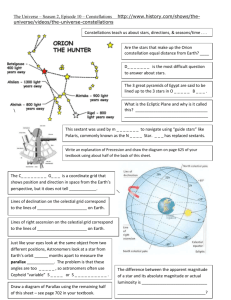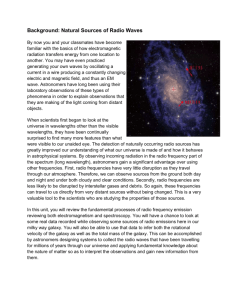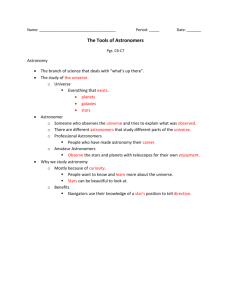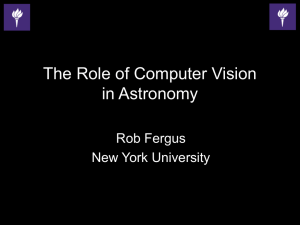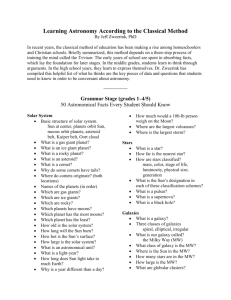What Does an Astronomer Do?
advertisement
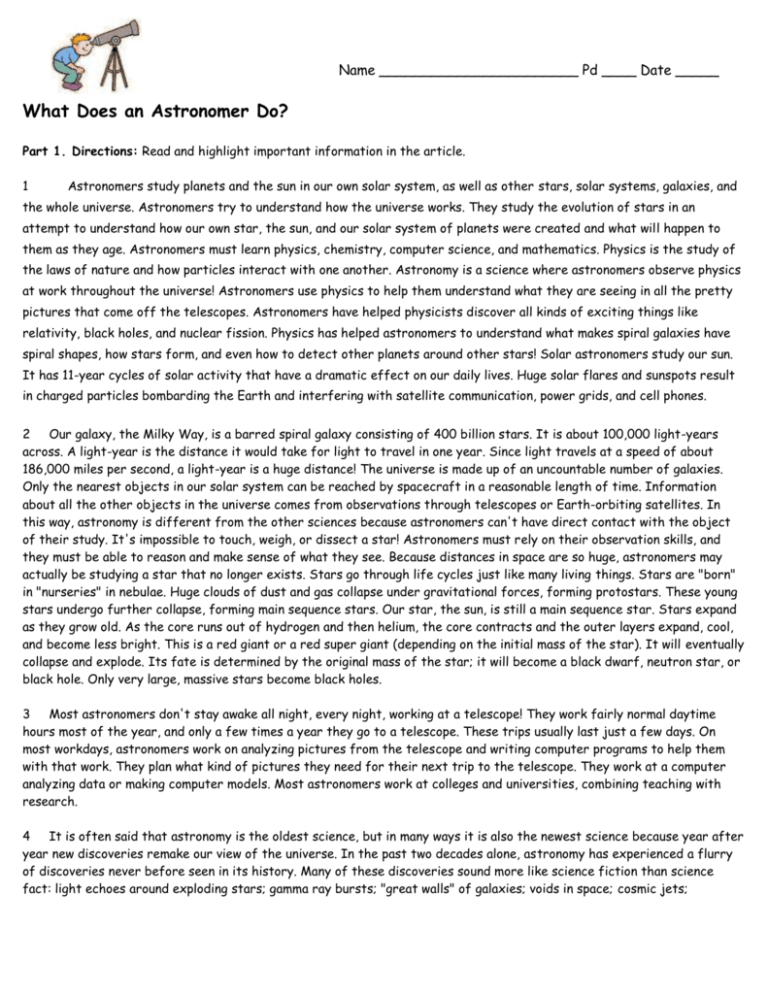
Name _______________________ Pd ____ Date _____ What Does an Astronomer Do? Part 1. Directions: Read and highlight important information in the article. 1 Astronomers study planets and the sun in our own solar system, as well as other stars, solar systems, galaxies, and the whole universe. Astronomers try to understand how the universe works. They study the evolution of stars in an attempt to understand how our own star, the sun, and our solar system of planets were created and what will happen to them as they age. Astronomers must learn physics, chemistry, computer science, and mathematics. Physics is the study of the laws of nature and how particles interact with one another. Astronomy is a science where astronomers observe physics at work throughout the universe! Astronomers use physics to help them understand what they are seeing in all the pretty pictures that come off the telescopes. Astronomers have helped physicists discover all kinds of exciting things like relativity, black holes, and nuclear fission. Physics has helped astronomers to understand what makes spiral galaxies have spiral shapes, how stars form, and even how to detect other planets around other stars! Solar astronomers study our sun. It has 11-year cycles of solar activity that have a dramatic effect on our daily lives. Huge solar flares and sunspots result in charged particles bombarding the Earth and interfering with satellite communication, power grids, and cell phones. 2 Our galaxy, the Milky Way, is a barred spiral galaxy consisting of 400 billion stars. It is about 100,000 light-years across. A light-year is the distance it would take for light to travel in one year. Since light travels at a speed of about 186,000 miles per second, a light-year is a huge distance! The universe is made up of an uncountable number of galaxies. Only the nearest objects in our solar system can be reached by spacecraft in a reasonable length of time. Information about all the other objects in the universe comes from observations through telescopes or Earth-orbiting satellites. In this way, astronomy is different from the other sciences because astronomers can't have direct contact with the object of their study. It's impossible to touch, weigh, or dissect a star! Astronomers must rely on their observation skills, and they must be able to reason and make sense of what they see. Because distances in space are so huge, astronomers may actually be studying a star that no longer exists. Stars go through life cycles just like many living things. Stars are "born" in "nurseries" in nebulae. Huge clouds of dust and gas collapse under gravitational forces, forming protostars. These young stars undergo further collapse, forming main sequence stars. Our star, the sun, is still a main sequence star. Stars expand as they grow old. As the core runs out of hydrogen and then helium, the core contracts and the outer layers expand, cool, and become less bright. This is a red giant or a red super giant (depending on the initial mass of the star). It will eventually collapse and explode. Its fate is determined by the original mass of the star; it will become a black dwarf, neutron star, or black hole. Only very large, massive stars become black holes. 3 Most astronomers don't stay awake all night, every night, working at a telescope! They work fairly normal daytime hours most of the year, and only a few times a year they go to a telescope. These trips usually last just a few days. On most workdays, astronomers work on analyzing pictures from the telescope and writing computer programs to help them with that work. They plan what kind of pictures they need for their next trip to the telescope. They work at a computer analyzing data or making computer models. Most astronomers work at colleges and universities, combining teaching with research. 4 It is often said that astronomy is the oldest science, but in many ways it is also the newest science because year after year new discoveries remake our view of the universe. In the past two decades alone, astronomy has experienced a flurry of discoveries never before seen in its history. Many of these discoveries sound more like science fiction than science fact: light echoes around exploding stars; gamma ray bursts; "great walls" of galaxies; voids in space; cosmic jets; gravitational lenses; "dark" matter; Einstein rings. Such discoveries reveal a universe richer and more varied than had been suspected by earlier astronomers. 5 The night time sky is a source of beauty and wonder. You can experience this for yourself if you have an unobstructed view of the dark night sky -- just look up! We can all marvel at pictures of galaxies, nebulae, planets, and other celestial wonders the heavens contain, stretch our minds to comprehend the vast distances involved, and think about the meaning of it all. Humans want to know how the universe came into being, what our place in it is, and what other objects exist within it. Basically, we are curious, and astronomy enriches our lives because we want to "boldly go where no man has gone before." By Cindy Grigg Part 2. Directions: Answer the questions based on the article. 1. What do astronomers study? 5. What is a light year? __________________ Our solar system Other stars and galaxies _______________________________ The whole universe All of the above 2. What kind of galaxy is our galaxy, the Milky Way? 6. Where are stars born? _________________ A spiral galaxy A barred spiral galaxy _______________________________ A globular galaxy An elliptical galaxy 3. What is a light-year? A large unit of distance 7. How is astronomy different than other sciences? _______________________ A large unit of time A large galaxy 4. At what stage of its life cycle is our sun? Main sequence Black hole Red giant _______________________________

